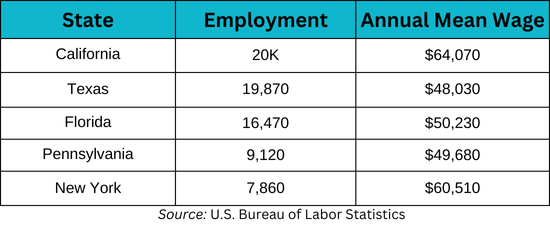Career Outlook: Medical Coding and Billing
By: Jenn Brusco
November 2024
A career in healthcare is a sound investment. The industry at large is on a growth trajectory, with increases in both spending and job growth.
According to Deloitte, “the demand for health care workers is expected to surge by 29% in the next decade.” The U.S. Bureau of Labor Statistics (BLS) echoes this sentiment, stating that healthcare jobs are “projected to grow much faster than the average for all occupations from 2023 to 2033.” For medical coding and billing professionals, the BLS anticipates must faster than average growth at 9% over the next decade, with an average of 15,000 new job openings expected each year.
Is There A Staffing Shortage in Medical Coding and Billing?

As with other healthcare occupations, staffing shortages continue to plague the industry. Several recent industry surveys have shown that there is a persistent shortage of qualified medical coders and billers. The American Health Information Management Association (AHIMA) “found notable shortages in the areas of data quality, consumer health information, and revenue cycle management, as well as privacy, risk and compliance, and data analytics.”
Medical coders and billers are integral to the healthcare revenue cycle, ensuring accurate records of patient interactions and services and billing accordingly.
Learn more about medical coding and billing careers.
Why Are Medical Coding and Billing Professionals in High Demand?
The need for qualified medical coding and billing professionals is ever-present in today’s job market. But why? There are several factors that contribute to this demand, including an aging population, wave of retirements, increased focus on healthcare data, and the continued digitization of health records.
The World Health Organization reports “by 2030, 1 in 6 people in the world will be aged 60 years or over.” And the U.S. Census Bureau has reported that the number of centenarians is expected to quadruple over the next 30 years. The growing aging population will have a direct impact on healthcare occupations, including medical coding and billing. Not only will healthcare teams see an increase in older patient interactions, but the number of healthcare professionals moving toward retirement will increase as well. Both of these scenarios will lead to an even higher demand for qualified healthcare professionals who can accurately record and bill for healthcare services rendered.
Beyond the increased workload and workforce vacancies on the horizon, healthcare teams are increasingly focusing on capturing, analyzing, and reporting meaningful data. This data is critical to improving patient care and outcomes, supporting public health, reducing medical errors or other adverse events, and more. Additionally, this data fuels the revenue cycle for the healthcare facility, ensuring accurate claims are filed and payment is recovered.
Medical coding and billing professionals are at the tip of the spear in healthcare documentation. Their attention to detail and commitment to recording accurate data is essential to both the acute patient interaction and the efficacy of the larger healthcare system.
What Are the Top States for Medical Coding and Billing Jobs?
Curious to learn how your home state stacks up for medical coding and billing jobs? Although the concentration of jobs varies across the nation, there are a few that stand out.

Additionally, Alaska, South Dakota, Montana, Idaho, and Kentucky boast a high concentration of jobs.
Where Can I Learn More About Starting My Career in Medical Coding and Billing?
Imagining yourself in a new career is exciting, especially when you can see the tremendous opportunities for growth on the horizon. Before you go all in on medical coding and billing, it’s important to gain an accurate perspective of the role itself and the effect this career will have on your life.
- Exploring a Career As a Medical Coding and Billing Specialist: Learn more about the role and responsibilities, salary expectations, training options, relevant credentials, and more.
- How Much do Medical Coding and Billing Specialist Make: Learn more about the role and responsibilities, salary expectations, training options, relevant credentials, and more.
- Medical Coding and Billing Training Program: Explore our DEAC accredited training program for medical coding and billing, including time commitments, tuition costs, course outlines, and more.
Students in the Medical Coding and Billing training program through the U.S. Career Institute complete their studies within 5 to 12 months and have a 79% success rate when sitting for their CBCS certification exam in 2023! Our self-paced learning materials allow our students to fit their studies into their life, not the other way around.
